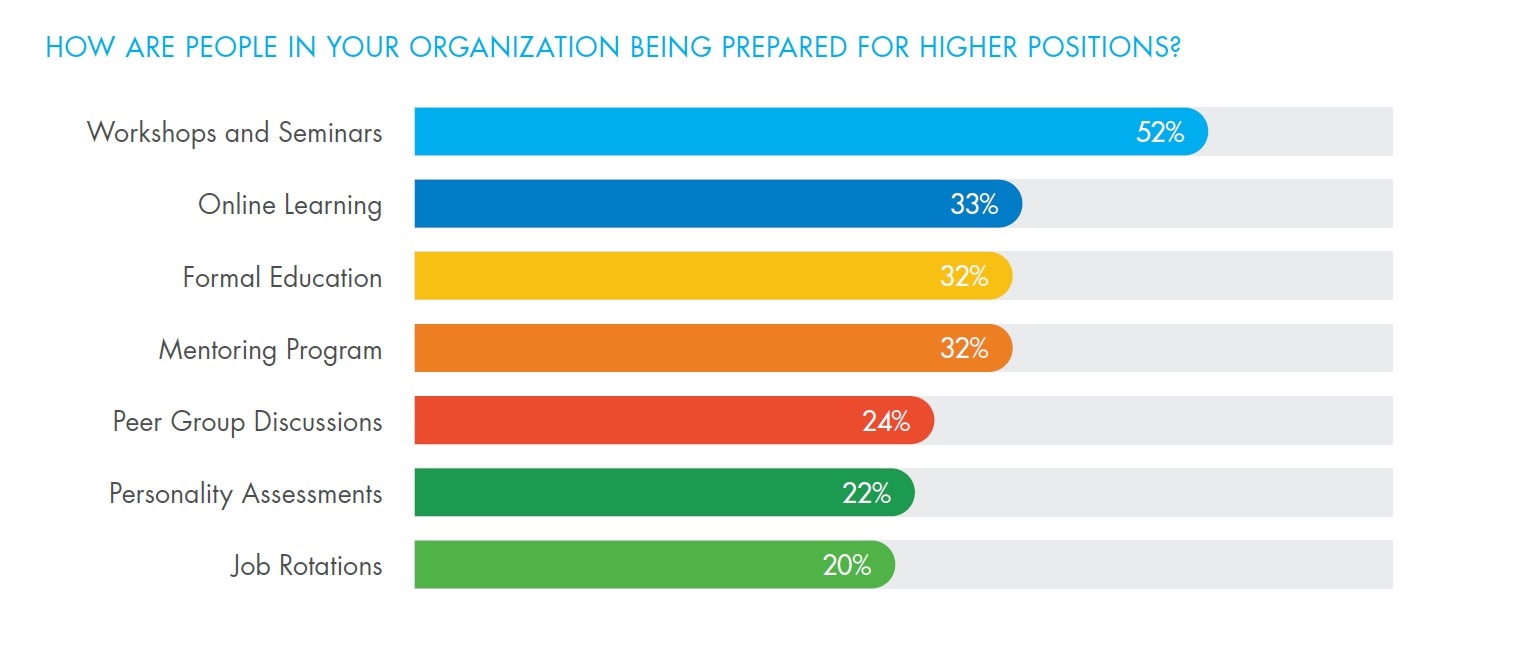Seventy-one percent of millennials who are likely to leave an organization within two years are unhappy with the professional development opportunities (or lack thereof) from their employers. While this data from Deloitte points to millennials, our Canadian People Trends research at Psychometrics shows that career development is a retention issue for employees across generations. Companies seem to understand this but few are taking significant action to respond.
We surveyed human resource professionals at more than 300 Canadian organizations from a wide range of industries to explore issues such as leadership, change, conflict, selection and diversity. Their responses highlighted a number of areas that companies need to address to continually develop and retain their people.
Workshops and seminars are the most popular method of preparing people for higher positions, and approximately one-third of organizations use online learning, formal education and mentoring programs. Assessments are not used as often; given the importance of interpersonal skills, communication and self-awareness in leadership roles, this is surprising. Job rotations and peer group discussions are also used infrequently across organizations. Job rotations provide a terrific opportunity for an individual to stretch themselves and gain critical experience that is very helpful for determining ones’ ideal career path. Peer discussions are also a form of mentoring and career advice that is highly informative and comes at very little cost.
We asked:
The most concerning development statistic relates to the level of personal activity and ownership of employees when it comes to managing their careers. According to HR professionals we surveyed, only 28% of employees have established career objectives and action steps to help them achieve their goals. Most employees are operating in a day-to-day way, and while work pressures and task loads obviously push this frame of reference on people, the need to strategically consider one’s career path remains.
While many employees are not significantly engaged in their own career development, the majority of organizations (67%) provide at least some support for staff development. The gap between the supports available and the uptake by employees could be due to a number of factors. These include a lack of awareness of the supports, which highlights an organizational communication problem, or a lack of time, which would suggest that employees are stretched too thin to take advantage of career development resources.
While the majority of organizations are providing some type of supports, few are providing the type of guidance that helps employees map and plan their careers. Only 15% of organizations offer career planning that is strategic and long-term. Most employees are left to their own devices when it comes to planning their careers. Organizations could put more effort into informing staff about their career options within the organization if they truly want to increase retention. For individuals, no one is more invested in their career than they are.
Consider this a wake-up call to all employees – do not wait for others to provide you with strategic career support. Currently only 28% of people have received the message and taken action.
For HR and career professionals, here are some steps you can take to begin supporting career development and improve retention in your organization.
- Take a genuine interest in employee career goals and goal-setting.
- Promote training opportunities to develop new skills.
- Encourage mentoring and job shadowing.
- Provide opportunities to develop self-awareness to understand individual strengths and gaps.
- Invite job rotations to help employees gain skills and increase collaboration.
- Create a succession planning program/process.
Want to write for CareerWise? Check out our Submission Guidelines and send in a proposal! All levels of experience welcome.








